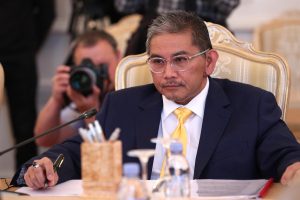ASEAN’s newly appointed special envoy to Myanmar says he will insist on meeting with jailed politicians, including Aung San Suu Kyi, in line with the Five-Point Consensus agreed by the Southeast Asian bloc in April.
Second Foreign Minister of Brunei Erywan Yusof was formally appointed by ASEAN last week, after protracted negotiations among the bloc’s 10 member states. Speaking to reporters on Saturday in his first public remarks about the role, he said a plan to visit Myanmar was “in the pipeline,” and would be confirmed once he had consulted with all countries and actors concerned.
Erywan promised that there would be a “more substantive discussion” than that which took place in June, when he visited Myanmar with ASEAN Secretary General Lim Jock Hoi. The visit was roundly criticized after the pair failed to meet with any opposition figures, and an ASEAN press release, later removed from the group’s website, referred to the junta leaders by their self-chosen titles, conferring inadvertent recognition on the military government that seized power in February.
“What we need to do is make sure we’re well prepared when we go there, unlike the visit I had in June,” Erywan told reporters, effectively admitting that the trip had fallen short of expectations. He pledged that his upcoming visit would focus on “cessation of violence, dialogue, and mediation,” and that it “will involve all parties concerned,” in line with the Five-Point Consensus.
This presumably means that the envoy will seek access to Aung San Suu Kyi and other jailed members of the ousted National League for Democracy (NLD) government, as well as representatives of the shadow National Unity Government (NUG)
The five-point consensus “clearly states that it will involve all parties concerned,” Erywan added. “And that’s something that we will uphold. Because that was what the leaders agreed, with Myanmar included, so there is no two ways about it.”
After months of halting progress from ASEAN, securing a meeting with Aung San Suu Kyi or representatives of the NUG would be no doubt be considered something of a breakthrough. But it is unclear what either of these things would achieve in themselves, aside from offering the envoy a chance to check up on the detained leader’s health and well-being.
While the Five-Point Consensus calls on the envoy to “facilitate mediation of the dialogue process,” that ultimately relies on the generals being willing to deal with the NLD and anti-coup opposition as legitimate partners for dialogue.
As I suggested after Erywan’s appointment last week, there is little chance of that happening. Back in May, the junta declared the NUG, its People’s Defense Force, and the Committee Representing Pyidaungsu Hluttaw (CRPH) to be “terrorist organizations,” a charge that the junta’s foreign minister, Wunna Maung Lwin, repeated during last week’s ASEAN-EU Ministerial Meeting.
“Myanmar would not support the idea of engaging with CPRH and NUG since the Anti-Terrorism Central Committee on 8 May 2021 had declared them and their subordinates as terrorist groups,” he told European officials. After all, one rarely negotiates with “terrorists.”
As Aung Zaw, the editor of The Irrawaddy, hinted last week, the question is less what the special envoy will achieve than what he will be allowed to achieve. Describing Myanmar as a “special envoys’ graveyard,” he cited the long line of envoys and “special rapporteurs” whom past military juntas variously ignored, strung along, co-opted, or barred from the country.
“If the junta leaders want to avoid losing face any further, the special envoy’s visit and engagement should provide an opportunity for them to climb down off the cliff and negotiate with the NLD and other political forces,” Aung Zaw wrote. “But that is wishful thinking. We know the answer. The generals won’t take this path.”

































